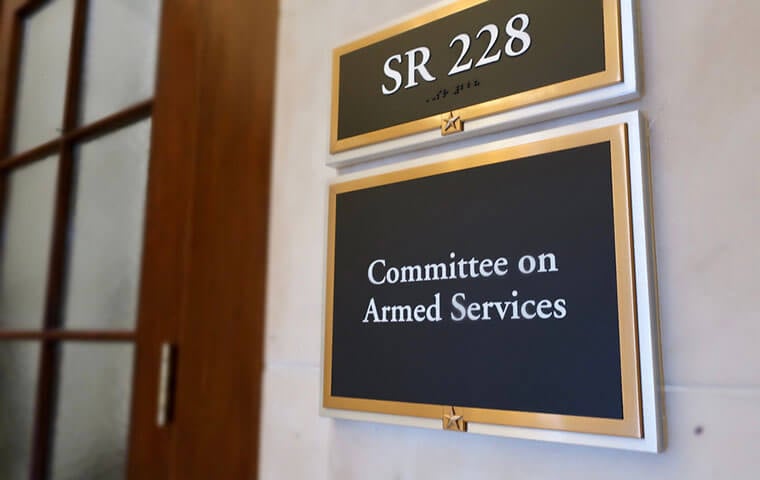 The Senate Armed Services Committee will write its counterpart bill this week. Image: DCStockPhotography/Shutterstock.com
By: FEDweek Staff
The Senate Armed Services Committee will write its counterpart bill this week. Image: DCStockPhotography/Shutterstock.com
By: FEDweek StaffThe annual defense authorization bill (HR-8070) up for voting in the House this week contains a range of provisions that would affect federal employment policies, some of them government-wide and some affecting only DoD.
Among the government-wide provisions is one requiring that federal employees who are spouses of active-duty military personnel be allowed to work remotely “to the extent practicable” if the position is suitable for it. If not, agencies would have to offer a position where the military member is assigned “of equal status and base pay” for which the individual is qualified, or an equivalent one that could be performed remotely from there.
Other government-wide provisions include: extending through 2033 a special hiring authority into civil service jobs for spouses of military personnel; continuing several special pay authorities for federal employees working in danger areas overseas; and increasing from 15 to 20 days annually the leave granted to federal employees for active military duty. The House rules committee disallowed an amendment that would block the implementation of a future Schedule F, which could see tens of thousands of feds in the competitive service moved into the excepted service – effectively making them at-will; although related provisions could still be added in the Senate.
Provisions applying only to DoD include: establishing a “chief talent officer” position to oversee issues including recruitment, training and offsite work practices; allowing DoD employees to voluntarily work on overseas assignments longer than the general current five-year limit; requiring the department to write a new staffing and compensation model for its child-care positions; and requiring a similar review of “mission-critical” occupations.
Also, DoD would have to produce a report on “disparities between the cost-of-living and current rates of locality pay” for its GS employees, and GAO would be tasked with reviewing potential alternative models of measuring white-collar salaries against the private sector. DoD further would have to report on the accuracy of comparisons with local blue-collar pay for employees under the wage-grade pay system.
The Senate Armed Services Committee will write its counterpart bill this week.
Meanwhile, the House Appropriations Committee is to vote this week on a separate key bill for federal workplace issues, the general government appropriations bill. That measure offers the best chance for proponents of a January 2025 federal employee raise larger than the 2 percent recommended by Biden to set a higher figure.
OPM Advises Agencies on Conducting RIFs During Shutdown
Updated Shutdown Contingency Plans Show Range of Impacts
Use Shutdown as Justification for More RIFs, OMB Tells Agencies
Unions Win a Round in Court Disputes over Anti-Representation Orders
Deferred Resignation Periods End for Many; Overall 12% Drop
Senate Bill Would Override Trump Orders against Unions
See also,
How to Handle Taxes Owed on TSP Roth Conversions? Use a Ladder
The Best Ages for Federal Employees to Retire
Best States to Retire for Federal Retirees: 2025

